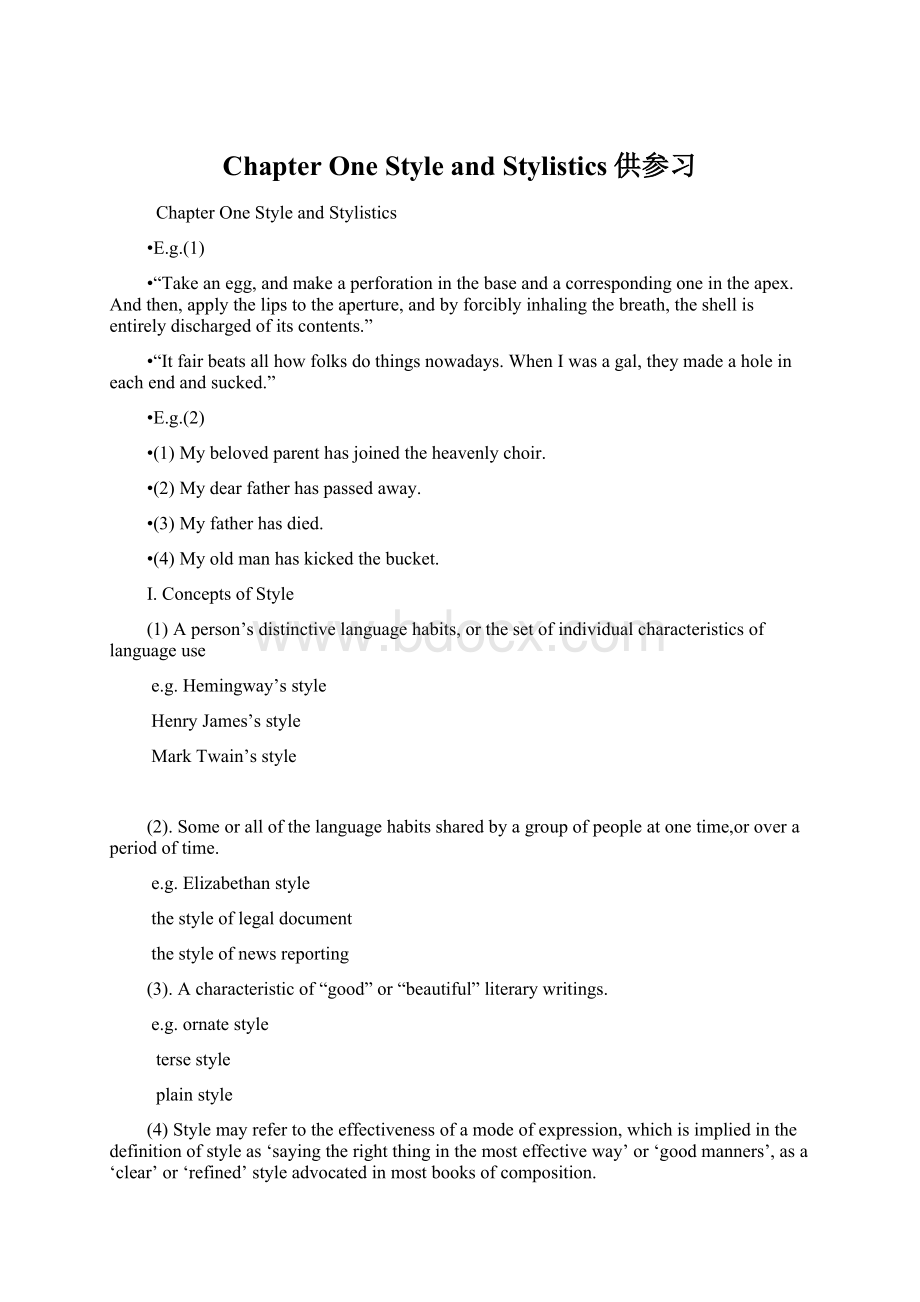Chapter One Style and Stylistics供参习.docx
《Chapter One Style and Stylistics供参习.docx》由会员分享,可在线阅读,更多相关《Chapter One Style and Stylistics供参习.docx(11页珍藏版)》请在冰豆网上搜索。

ChapterOneStyleandStylistics供参习
ChapterOneStyleandStylistics
•E.g.
(1)
•“Takeanegg,andmakeaperforationinthebaseandacorrespondingoneintheapex.Andthen,applythelipstotheaperture,andbyforciblyinhalingthebreath,theshellisentirelydischargedofitscontents.”
•“Itfairbeatsallhowfolksdothingsnowadays.WhenIwasagal,theymadeaholeineachendandsucked.”
•E.g.
(2)
•
(1)Mybelovedparenthasjoinedtheheavenlychoir.
•
(2)Mydearfatherhaspassedaway.
•(3)Myfatherhasdied.
•(4)Myoldmanhaskickedthebucket.
I.ConceptsofStyle
(1)Aperson’sdistinctivelanguagehabits,orthesetofindividualcharacteristicsoflanguageuse
e.g.Hemingway’sstyle
HenryJames’sstyle
MarkTwain’sstyle
(2).Someorallofthelanguagehabitssharedbyagroupofpeopleatonetime,oroveraperiodoftime.
e.g.Elizabethanstyle
thestyleoflegaldocument
thestyleofnewsreporting
(3).Acharacteristicof“good”or“beautiful”literarywritings.
e.g.ornatestyle
tersestyle
plainstyle
(4)Stylemayrefertotheeffectivenessofamodeofexpression,whichisimpliedinthedefinitionofstyleas‘sayingtherightthinginthemosteffectiveway’or‘goodmanners’,asa‘clear’or‘refined’styleadvocatedinmostbooksofcomposition.
Definitionofstyle
•wewillseesomemostinfluentialandrepresentativeviewsofstyle.(英语文体学要略p11)
•Styleasform.(Aristotle)(formandcontent)
•Styleaseloquence.(Cicero)(skilltouselanguagepersuasively)(therelationwithrhetoric)
•Styleistheman.(Buffon)
•Styleaspersonalidiosyncrasy.(Murry)
•Sayingtherightthinginthemosteffectiveway.(Enkvist)
•Styleasthechoicebetweenalternativeexpressions.(Enkvist)
•Styleasequivalence.(RomanJacobson)(betweenformandfunction)
•Styleasforegrounding.(LeechMukarovsky)
•Styleasdeviation.(Mukarovsky&Spitzer)
•Styleasprominence.(Halliday)
•Styleastheselectionsfeaturespartlydeterminedbythedemandsofgenre,form,themes,etc.(Traugott&Pratt)
•Styleaslinguisticfeaturesthatcommunicateemotionsandthought.(Enkvist)(见教材:
P5-7)
•Mannerindicatingprominentlinguisticfeatures,devicesorpatterns,most(orleast)frequentlyoccurinaparticulartextofaparticularvarietyoflanguage.
•Themannerofexpressioninwritingorspeakingwhichchangesatalltimesaccordingtotheactualsituationalelements,e.g.,theparticipants,time,place,topic,etc,ofthecommunicativeevent,fromveryformaltoveryinformal.(见教材P5)
•e.g.(Afteraquarrelbetweenthetwolovers)
Withaflowofwords,shestartedtoarguewithhim,thenshecheckedherselfandsaidcalmly,“Listen,John,Iimagineyou’retiredofmycompany.There’snosenseinhavingteatogether.IthinkI’dbetterleaveyourighthere.”
“That’sfine,”hesaid.“Goodafternoon.”
“Good-bye.”
•文体的理解虽说众说纷纭,但在当今比较有影响的文体理论主要有三种:
把文体看做选择,包括对意义何语言形式的选择;而是变异说,把文体视为变异,即语言在常规的基础上产生的意义及形式的变化;三是突出说,把文体看做突出,或者称为前景化,指特定的语言成分在其他部分或者说是背景的衬托下得到突出或强调。
这一理论跟变异有很大的联系,影响深远。
II.ConceptsofStylistics
1.Stylisticsisadisciplinethatstudiesthewaysinwhichlanguageisused;itisadisciplinethatstudiesthestylesoflanguageinuse.
2.Stylisticsisabranchoflinguisticswhichappliesthetheoryandmethodologyofmodernlinguisticstothestudyofstyle.
•3.D.Crystal:
Linguisticsistheacademicdisciplinethatstudieslanguagescientifically,andstylistics,asapartofthisdiscipline,studiescertainaspectsoflanguagevariation.
-----InvestigatingEnglishStyle
•4.G.N.Leech:
Stylisticsisalinguisticapproachtoliterature,explainingtherelationbetweenlanguageandartisticfunction,withmotivatingquestionssuchas“why”and“how”morethan“what”.
----StyleinFiction:
ALinguisticGuidetoEnglishPoetry
●5.Stylisticsisabranchoflinguisticswhichstudiesthecharacteristicsofsituationally-distinctiveusesoflanguage,withparticularreferencetoliterarylanguage,andtriestoestablishprinciplescapableofaccountingfortheparticularchoicesmadebyindividualsandsocialgroupsintheiruseoflanguage.
E.g.Housewifetomilkman:
•a.Canyouleaveonebottleandfouryoghurtstomorrowplease?
•b.Leaveonebottleandfouryoghurtstomorrowanddon’tforget.
•c.Itwouldbegreatlyappreciatedifyoukindlyleaveonebottleandfouryoghurtstomorrow.
•d.Wouldyouleaveonebottleandfouryoghurtstomorrow,justforme.
6.Stylisticsisabranchoflinguisticswhichstudiesstyleinascientificandsystematicwayconcerningthemanners/linguisticfeaturesofdifferentvarietiesoflanguageatdifferentlevels.(见教材P8)
FourLevelsofLinguisticDescription
•Thelevelofphonology/graphology
•Theleveloflexis
•Thelevelofsyntax/grammar
•Thelevelofsemantics
•Whatisthemainpurposeofstylistics?
•
(1)toanalyzelanguagehabits----toidentify,fromthegeneralmass,thosefeaturesrestrictedtocertainkindsofsocialcontext;
•
(2)toexplainwhyandsuchfeatureshavebeenusedasopposedtoothers;
•(3)toclassifythesefeaturesintocategoriesbaseduponaviewoftheirfunctioninthesocialcontext.
•By“features”wemeanparticularchoiceofwords,sequenceofwords,orwayofutterance,so-calledstylisticallydistinctivefeatures.
III.TheScopeofStudies
LiteraryStylistics
GeneralStylistics
•Literarystylistics:
concentratingontheuniquefeaturesofvariousliteraryworks,suchaspoem,novel,prose,drama…
•Generalstylistics:
concentratingonthegeneralfeaturesofvarioustypesoflanguageuse,includingliterarydiscoursesandotherpracticalstyles.
IV.Abriefintroductiontothedevelopmentofstylistics(见教材P9-12)
•Rhetoric(Aristotle)
•Beginning(CharlesBally)
•Development
(L.Spitzer)
•Flourish(InvestigatingEnglishStyle)
V.TheNeedForStylisticStudy(见教材P5)
•
(1)Styleisanintegralpartofmeaning.
•Withoutthesenseofstylewecannotarriveatabetterunderstandingofanutterance.
•e.g.Policeman:
What’syourname,boy?
•Blackpsychiatrist:
DrPoussaint.I’maphysician.
•Policeman:
What’syourfirstname,boy?
•Blackpsychiatrist:
Alvin.
(2)Stylisticstudyhelpscultivateasenseofappropriateness
*Whospeakswhatlanguagetowhomandwhen
*Properwordsinproperplacesmakethetruedefinitionofastyle.
--Swift
•First,acertainstyleisdeterminedbythecharacteristicsoftheUSERoflanguage,suchastheage,sex,education,socio-regionalorethnicbackground.
•Second,it’srelatedtothecharacteristicsoftheUSEoflanguageinsituation:
#role-relationshipbetweenaddresserandaddressee(degreeofintimacy)
#mediumofcommunication(speechorwriting)
#setting:
privateorpublic
#purposeforwhichlanguageisused
(toinform,persuade…)
ForExample:
(1)
DearSir,Imustapologizeforthedelayinreplyingtoyourletterofthe30thofDecember…
(2)DearJane,I’mterriblysorrynottohavegotroundtowritingbeforenow…
(3)
•Whenhisdaddied,Peterhadtogetanotherjob.
•Afterhisfather’sdeath,Peterhadtochangehisjob.
•Onthedeceaseofhisfather,Mr.Brownwasobligedtoseekalternativeemployment.
Otherexamplesaretheuseoftaboowordsorslangyexpressioninanotherwisedignifiedcontext:
E.g.Inordertogetaheadinthemodernwesternworld,sometimesyouhavetobewillingtoeatshit.
•E.g.Intheopinionofmanystudents,thedean‘scommencementaddressstank(tobeveryunpleasantorbad).
•E.g.Havinglearntthatyouwonthefirstprizeinthespeechcontest,Ihavecomeinpersontocongratulateyou,myfriend,onyoursuccess.
(Thissentencewouldsoundmostbookishifspokenonaninformaloccasion.)
•Evensynonymshavetheirvaryingstylisticovertones.
•E.g.
(1)steed(poetic);horse(general);nag(slang);gee-gee(babylanguage)
(2)domicile(veryformal,official);residence(formal);abode(poetic);home(general)
(3)cast(literary,biblical);throw(general);chuck(casual,slang)
•(4)diminutive(veryformal);tiny(colloquial);wee(colloquial,dialectal)
•美国著名社会语言学家D.H.Hymes认为语言交际能力包括语法上的正确性、形式上的可行性、现实中的真实性和场合上的得体性。
•如何说话才得体呢?
要想说话得体,不但要注意说话场合,还要考虑对方的年龄、身份、受教育程度、与说话人的亲疏关系、东西方文化差异等因素。
•
(1)场合:
Languageislikedress.Wevaryourdresstosuittheoccasion.Wedonotappearatafriend’ssilverweddinganniversaryingardeningclothes,nordowegopuntingontheriverinadinnerjacket.
•
(2).年龄
•Excuseme,couldyoupleasetellmehowtogetto...?
•Excuseme,isthistherightwayto...?
•Excuseme,wouldyoupossibly(orbyanychance)beabletotellmehowtogetto...?
•(3).身份。
请看下面两例:
•Thepolicemansaidtothejudge,“Iapprehendedtheallegedperpetrator.”(那警察对法官说:
“我逮捕了那个犯罪嫌疑人。
”)
•Inabarthepolicemansaidtohiscolleagues,“Icollaredthiscreep.”(在酒吧那个警察对同事说:
“我揪住了这个兔崽子。
”)
•(4).受教育育程度。
说话要看对方的教育程度。
如果对方文化程度很低或根本就没受过教育,对他讲话时你必须用一般的口语体。
反之,如果对方是一位学者,如果你用俚语跟他说话,也会令其不快。
请看下面一段对话,谈话的一方是书生气十足的作家,言谈中使用的均是专业术语、难词和文绉绉的词。
而另一方则是一位农夫,说的都是浅显易懂的家常话。
•“Youfindthenettles(荨麻)verydifficulttoeradicate(拔除)?
”(Thepeasantsaidhefoundthemhardtokeepdown.)
•“Theydisseminate(散播)themselvesmostluxuriantly(茂盛地),”thewritersaid.(Thepeasantrepliedthattheyspreadlikethedickens.)
•“ButtheyhavetheirutilityintheeconomyofNature,”thewritersaid.
•Thepeasantrepliedthatnaturewaswelcometothemasfarashewasconcerned.
•Thewriterthenremarkedthatitwasmostsalubrious(宜人的)weather,andthepeasantagreedthatithadbeenafineday.Butthewriterwasafraid,hesaid,thatthearidity(干旱)oftheseasonwasdeleterious(有害的)tothecrops,andthepeasantrepliedthathispotatoesweredoingbadly.Afterthat.thepeasantthought,itoccurredtohimthattheydidnotspeakthesamelanguage.
•(5).与说话人的亲疏关系。
•请看下面几句话,它们表达的是同一个意思,即说话人想要借对